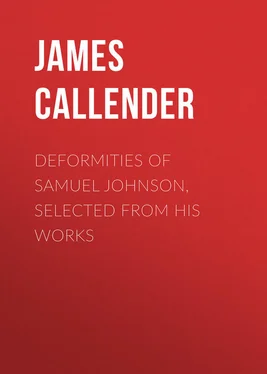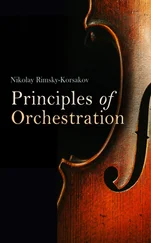James Callender - Deformities of Samuel Johnson, Selected from His Works
Здесь есть возможность читать онлайн «James Callender - Deformities of Samuel Johnson, Selected from His Works» — ознакомительный отрывок электронной книги совершенно бесплатно, а после прочтения отрывка купить полную версию. В некоторых случаях можно слушать аудио, скачать через торрент в формате fb2 и присутствует краткое содержание. Жанр: foreign_antique, foreign_prose, на английском языке. Описание произведения, (предисловие) а так же отзывы посетителей доступны на портале библиотеки ЛибКат.
- Название:Deformities of Samuel Johnson, Selected from His Works
- Автор:
- Жанр:
- Год:неизвестен
- ISBN:нет данных
- Рейтинг книги:4 / 5. Голосов: 1
-
Избранное:Добавить в избранное
- Отзывы:
-
Ваша оценка:
- 80
- 1
- 2
- 3
- 4
- 5
Deformities of Samuel Johnson, Selected from His Works: краткое содержание, описание и аннотация
Предлагаем к чтению аннотацию, описание, краткое содержание или предисловие (зависит от того, что написал сам автор книги «Deformities of Samuel Johnson, Selected from His Works»). Если вы не нашли необходимую информацию о книге — напишите в комментариях, мы постараемся отыскать её.
Deformities of Samuel Johnson, Selected from His Works — читать онлайн ознакомительный отрывок
Ниже представлен текст книги, разбитый по страницам. Система сохранения места последней прочитанной страницы, позволяет с удобством читать онлайн бесплатно книгу «Deformities of Samuel Johnson, Selected from His Works», без необходимости каждый раз заново искать на чём Вы остановились. Поставьте закладку, и сможете в любой момент перейти на страницу, на которой закончили чтение.
Интервал:
Закладка:
'Swift in his petty treatise on the English language, allows that new words must sometimes be introduced, but proposes that none should be suffered to become obsolete 38 38 Vide Preface to folio Dict.
.' The Doctor has not given a fair quotation from Swift. One would imagine that Swift had proposed to retain every word which is to be found in any of our popular authors, but he neither said nor meant any such thing. His words are these: 'They' (the members of the proposed society) 'will find many words that deserve to be utterly thrown out of our language !' And the Dean says nothing afterwards which infers a contradiction 39 39 Dr Campbell of Aberdeen, on the use of new words, says, 'That nothing can be juster than Johnson's manner of arguing on this subject, in regard to what Swift a little chimerically proposeth, that though new words be introduced, none should be suffered to become obsolete.' This Gentleman ought to have consulted Swift himself. Let him peruse the 'petty treatise,' and then let him blush for having trusted an author void of fidelity.
.
In his account of Lyttleton, the Doctor's good nature is evident. He speaks not a word as to the merit of the history of Henry II. but – 'It was published with such anxiety as only vanity can dictate.' We are next entertained with a page of dirty anecdotes concerning its publication, which the Doctor seems to have picked up from some printer's journeyman. 'The Persian Letters have something of that indistinct and headstrong ardour for liberty which a man of genius always catches when he enters the world, and always suffers to cool as he passes forward.' Of the admired monody to the memory of Lady Lyttleton, we are told only that it is long . 'His dialogues of the dead were very eagerly read, tho' the production rather, as it seems of leisure than of study, rather effusions than compositions. The names of his persons too often enable the reader to anticipate their conversation; and when they have met, they too often part without a conclusion.' These remarks apply with peculiar justice to Dr Johnson's dictionary, for that work is an effusion rather than a composition . His reader is for the most part able to anticipate his definitions, and they generally end without conclusion. Lord Lyttleton's poems 'have nothing to be despised and little to be admired .' But here, as usual, the Doctor contradicts himself, and in the very next line 'of his Progress of Love, it is sufficient blame to say that it is pastoral. His blank verse in Blenheim has neither much force, nor much elegance. His little performances, whether songs or epigrams, are sometimes spritely, and sometimes insipid ' – and of course despicable . The candid and accurate author of the Rambler has forgot the existence of that beautiful blossom of sensibility, that pure effusion of friendship, the prologue to Coriolanus.
The life of Dr Young has been written by a lawyer, who conveys the meanest thoughts in the meanest language. His stile is dry, stiff, grovelling, and impure. His anecdotes and ideas, are evidently the cud of Dr Johnson's conversation. He continues in the same fretful tone from the first line to the last. He is at once most contemptuous and contemptible. Whatever he says is insipid or disgusting. He is the bad imitator of a bad original; and an honest man cannot peruse his libel without indignation. He steps out of his way to remind us of Milton's corporal correction , a story fabricated, as is well known, by his Employer. His ignorance has already been illustrated in a periodical pamphlet. Johnson himself, with all his imperfections, is often as far superior to this unhappy penman, as the author of the Night-Thoughts is superior to Johnson. And yet this critical assassin, this literary jackall, is celebrated by the Doctor 40 40 As the venerable and admirable father of the English Dictionary has treated the names of such men as Young and Lyttleton with so little ceremony, the reader will perhaps forgive the insertion of his own character, as drawn by Chesterfield. 'I am almost in a fever, whenever I am in his company. His figure (without being deformed) seems made to disgrace or ridicule the common structure of the human body. His legs and arms are never in the position, which, according to the situation of his body, they ought to be in; but constantly employed in committing acts of hostility upon the graces. He throws any where but down his throat, whatever he means to drink; and only mangles what he means to carve. Inattentive to all the regards of social life , he mistimes, or misplaces every thing. He disputes with heat, and indiscriminately, mindless of the rank, character, and situation, of those with whom he disputes; absolutely ignorant of the several gradations of familiarity or respect, he is exactly the same to his superiors, his equals, and his inferiors; and therefore by a necessary consequence absurd to two of the three. Is it possible to love such a man? No. The utmost I can do for him, is to consider him as a respectable Hottentot.' Churchill's account of our hero comes nearly to the same. And I presume that the inimitable Dr Smollet, has exhibited a third picture of this illustrious original in Humphry Clinker, Vol. 1. – Dr Johnson's letter to the Earl of Chesterfield concludes in these words: 'Whatever be the event of my endeavours, I shall not easily regret an attempt which has procured me the honour of appearing thus publicly, my Lord, your Lordship's most obedient, and most humble servant, Sam. Johnson.' These extracts afford a striking contrast between the severity of the polite peer, and the humble politeness (for once ) of the rugged pedant.
. Pares cum paribus facile congregantur.
'Dryden's poem on the death of Mrs Killigrew is undoubtedly the noblest ode that our language ever has produced. The first part flows with a torrent of enthusiasm. All the stanzas, indeed, are not equal.' He proceeds to compare it with an imperial crown, &c. But, a little after, 'the ode on St Cecilia's day is allowed to stand without a rival 41 41 Lives of English poets, vol. iii. p. 243 and 284. 12 mo edit.
.' These are his identical words; and his admirers may reconcile them if they can. Indeed, he seems ashamed of his own inconsistency, and is ready to relapse; but thinks, upon the whole, that Alexander's Feast 'may, perhaps , be pronounced superior to the ode on Killigrew.' Dr Johnson is said to be the greatest critic of his age; yet the verses on Mrs Killigrew are beneath all criticism; and, perhaps, no person ever read them through, except their author, and himself.
Dryden's fable 'of the Cock and Fox seems hardly worth the labour of rejuvenescence 42 42 Vide Life of Dryden.
.' Some narcotic seems to have refrigerated the red liquor which circulates in the Doctor's veins 43 43 Vid. Dict. article Blood.
, and to have hebetated and obtunded his powers of excogitation 44 44 Excogitation , this combination of letters is to be found in the Doctor's works, though not in his Dictionary.
, for elegance and wit never met more happily than here. Peruse only the first page of this poem, and then judge. The nonsense which has been written by critics is, in quantity and absurdity, beyond all conception. Perhaps his admirers may answer, that my remark is but the ramification of envy, the intumescence of ill-nature, the exacerbation of 'gloomy malignity.' However, it would not be amiss to commit that page of inanity to the power of cremation ; and let not his fondest idolaters confide in its indiscerptibility . In painting the sentiments and the scenes of common life, to write English which Englishmen cannot read, is a degree of insolence hardly known till now, and seems to be nothing but the poor refuge of pedantic dullness.
Интервал:
Закладка:
Похожие книги на «Deformities of Samuel Johnson, Selected from His Works»
Представляем Вашему вниманию похожие книги на «Deformities of Samuel Johnson, Selected from His Works» списком для выбора. Мы отобрали схожую по названию и смыслу литературу в надежде предоставить читателям больше вариантов отыскать новые, интересные, ещё непрочитанные произведения.
Обсуждение, отзывы о книге «Deformities of Samuel Johnson, Selected from His Works» и просто собственные мнения читателей. Оставьте ваши комментарии, напишите, что Вы думаете о произведении, его смысле или главных героях. Укажите что конкретно понравилось, а что нет, и почему Вы так считаете.












